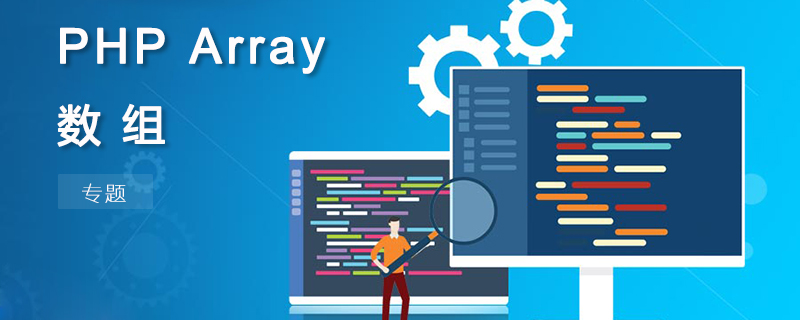Home > Article > Backend Development > PHP ARRAY array function (special topic)
PHP ARRAY array function topic includes the concept of PHP ARRAY array, introduction to various PHP array functions and their usage methods and cases, as well as video tutorials of PHP ARRAY array function and related selected articles. Welcome to collect and learn !

Summary in one sentence: An array is a special variable that can store more than one value at the same time, which means that an array can store one or more values in a separate variable name.
Official explanation [Array array]: array in PHP is actually an ordered map. A mapping is a type that associates values to keys. This type is optimized for many different uses; it can be viewed as an array, a list (a vector), a hash table (an implementation of a map), a dictionary, a set, a stack, a queue, and more. Since the values of array can be other arrays, tree structures and multidimensional arrays are also allowed.
PHP ARRAY function, that is, the array function, is a very powerful collection of functions that belongs to the core part of PHP, because arrays are an indispensable tool for storing, managing, and operating variable groups! In PHP, we can use these array functions without installation. These functions allow you to use and manipulate arrays in different ways.
PHP supports simple arrays and multi-dimensional arrays. Arrays can be created by the user themselves or by other functions (such as the method introduced in "php Method of Creating Arrays"). There are also many special database processing functions that return arrays from database queries as well as functions that return arrays.
《The most complete summary of PHP array operation methods, allowing you to easily master it! 》This article introduces the basic functions of array operations, array segmentation and filling, arrays and stacks, arrays and queues, callback functions, array sorting, array calculations, other array functions, etc. Such a conscientious work, hurry up and collect it~
The selected articles and video tutorials compiled below all contain practical cases to teach you step by step how to use array functions. Don’t miss it:
1. "PHP Development Basics Array Chapter" (Video Recommendation)
2. "PHP Array Learning Series Summary (continuously updated~) 》(Article recommendation)
3.《Summary of methods to remove duplicate values from php arrays》(Article)
4.《 Principles of PHP array implementation》(Article)
5,《Delete PHP array element key values and reorder》(Picture, text and video)
6,《 Two methods of converting php arrays to strings》(graphic video)
7, "PHP array serialization and deserialization"(graphic video )
8, "PHP array to json format and json reverse conversion" (graphic video)
9, "Maximum and minimum value in PHP array Calculation of the difference in values》(Picture, text and video)
The purpose of using arrays is to combine multiple mutual Related data are organized together to form a collection and used as a unit to achieve the purpose of batch data processing.
Finally, I want to say that in the process of learning PHP, arrays are the most basic and important knowledge point. However, if you want to truly acquire PHP development skills, in addition to being proficient in the array part, there are other knowledge points. Such as PHP file operations, PHP loops, object-oriented, forms, sessions, cookies, etc., then for PHP beginners, I recommend " A 2022 PHP learning path, please check it out! 》, everyone is welcome to refer to and study!
Related recommendations: 《php session session (topic)》|《php cookie (topic)》|《PHP file Operation function (special topic)》
The above is the detailed content of PHP ARRAY array function (special topic). For more information, please follow other related articles on the PHP Chinese website!